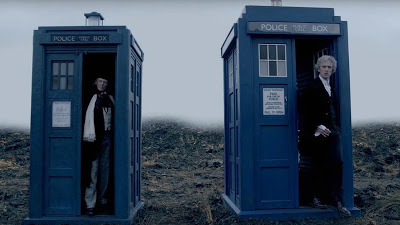Let’s talk about showrunners, writers, and season endcaps on Doctor Who, especially with “Twice Upon A Time” just under our belts. Spoilers, sweetie.
First, a reminder: For all the good he did for the franchise, I hated Russell T. Davies’ season endcaps. Hated them…especially the end of Donna Noble’s time as a companion. And at the same time, my favorite episodes were written by Steven Moffat… Particularly “The Empty Child” and “The Doctor Dances”.
And then Moffat became the showrunner. Since then, his writing has largely suffered from two things: A desire to be clever rather than compelling, and some subtle (and not-so-subtle) sexism.
The sexism problem Moffat’s tried to solve with fairly blatant “Oh, look, women! Women! Women are people, we know that!” moments written into the scripts. I wrote about him doing this with Sherlock, but that definitely happened in “Twice Upon A Time” as well, coming across as parroting the “right” thing to say rather than understanding why people are upset.1
But this time – though I think perhaps unintentionally – Moffat’s writing was a lot more clever than he might have meant.
The Christmas Armistice (or Truce) has sometimes been called a “miracle”, but it doesn’t make any sense as a religious phenomenon at all. It is a powerful tale not of religion, but of the very flawed nature of man. The same men who greeted and sang to each other tried desperately to kill each other the days before and after.
I still remember the story “Battle Angel” from Weird War Tales #94 . The story’s pretty simple: Also set in WWI, both the Germans and Allies think that they see an angel promising them victory; the reveal is what they truly saw was Death. Likewise, the Christmas Truce may have delayed the horrors and tragedy of such slaughter, but it did not fundamentally change anything.
Early in the episode, the Doctor says that the Universe rarely turns out like a fairy tale – and that is true with the Christmas Armistice as well.
But – and here’s the kicker – the episode ends with the Doctor, with the soldier he’s “saved” by returning him during the Armistice in the background, saying that the Universe rarely turns out like a fairy tale – but when it does, it’s because of him.
And it’s this echo that Moffat clearly wants us to think of. After Moffat’s near-obsession with “The War Doctor” and the horrors that the Doctor has faced, it’s an echo back to “The Doctor Dances” and his joyous cry that for once, everybody lives. It’s meant to be a cry of hope.
And it is hopeful – because it’s so horribly, awfully, wrong.
Everyone in that scene with the Doctor dies. The Christmas Armistice is a fractal microcosm of everything the Doctor does and every intervention that he’s ever taken. The problems persist, grow worse, and continue indefinitely. The Cybermen do more damage, in more realities. Despite every time he’s defeated them, the Daleks continue. And the list goes on.
The Doctor is not a messiah. He ultimately fails, and in a world where it is canonical that (whether through defeating the Devil or Owen Harper’s report that there’s nothing beyond death on Torchwood), he knows that nihilism is staring him in the face.
And, despite the occasional bout of handwringing, the Doctor has one fundamental and unchanging flaw. One massive amount of hubris.
It’s hope.
And despite the messiness of Moffat’s time as showrunner and as a writer, that hope in the face of darkness, that hope even when you want nothing more to give up, that hope that can be refilled by simply caring again… that is what sticks with me.
And as legacies go, that’s not a bad one at all.
1 Was I the only one who thought that they wrote Jodie Whittaker’s first scene as “a woman can’t drive”?
